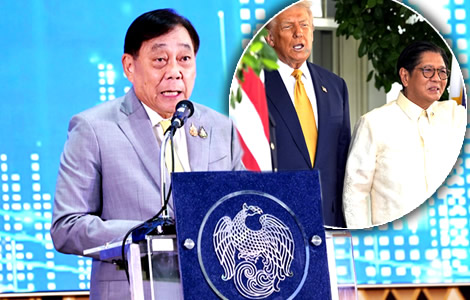Thailand makes a last-ditch push to secure a US tariff deal matching Vietnam’s 20% rate. With pressure rising after the Philippines’ zero-tariff pact, Bangkok must balance China ties and US demands before the August 1st deadline to avoid costly tariffs and political backlash.
Thailand is scrambling to clinch a last-ditch tariff deal with the United States. The target? Match or beat the 20% tariff Washington secured with Vietnam. Pressure mounted sharply when Philippine President Ferdinand Marcos struck a 19% tariff agreement with the U.S. Manila and Bangkok are both U.S. military allies and 1954 Manila Pact signatories. Yet their paths have sharply diverged. Over two decades, Thailand has pivoted closer to China, while the Philippines has recently doubled down on Washington to push back against Chinese aggression at sea. Crucially, like Vietnam, the Philippines’ booming population and economy are set to overtake Thailand’s by 2028. A recent IMF forecast warns Thailand could plunge from Southeast Asia’s second-largest economy to fifth within just a few years. The stakes could not be higher.

Thailand is preparing to submit its final counter proposal to the United States on Wednesday. Officials hope this move will secure a competitive trade deal. They aim to keep tariffs at no higher than 20%.
However, US negotiators insist on 0% tariffs across the board for American goods entering Thailand. Meanwhile, Washington has already achieved this with Vietnam. Moreover, on Tuesday, President Ferdinand Marcos Jr. agreed to a zero‑tariff deal with the US during his state visit to Washington. Consequently, the Philippines gained full access while settling for a 19% tariff on exports to the US.
Thailand faces intense pressure to match US tariff deals despite strong ties with China and RCEP membership
Thus, Thailand now finds itself under intense pressure to match that benchmark. Yet, Bangkok faces unique geopolitical constraints. Since 2001, Thailand has been a strategic partner of China. In addition, both countries are RCEP members. Furthermore, Chinese firms have steadily expanded their presence in Thai manufacturing since 2022.
Notably, this expansion has challenged local producers. Therefore, any sweeping concessions to the US could undermine Chinese investment interests. In turn, China reportedly exerts pressure behind the scenes. Beijing urges Thailand against granting the US unchecked market access. As a result, Thailand must delicately balance between rival powers.
Meanwhile, local political forces are voicing concern. On Tuesday, the Bhumjaithai Party announced plans for a Section 152 parliamentary debate. Specifically, the party seeks clarity on the final deal. Additionally, party leaders question whether negotiations have gone too far.
Bhumjaithai MPs, including Chaichanok Chidchob and Paradorn Prisananantakul, worry about tariff cuts on agricultural imports. They fear that zero tariffs would devastate Thai farmers. “Farmers could lose out badly,” said Paradorn. “They need protection.”
Opposition warns of sovereignty risks if trade deal concessions to US deepen and hurt the economy
Moreover, the party warns of sovereignty risks if Brussels-style trade concessions deepen. “Thai interests must remain central,” the party spokesperson said. “Otherwise, we risk losing control of our own economy.”
In response, Finance Minister Pichai Chunhavajira said Thailand has already resolved more than 90% of US concerns. Furthermore, he confirmed that the final proposal would be submitted by July 23. “We are working around the clock,” Pichai added. “We want a deal that benefits Thailand.”
Moreover, Pichai suggested the US views Southeast Asia collectively. “They want regional consistency,” he said. “Thailand must stay competitive.”
That competitiveness now hinges on matching deals won by Vietnam and the Philippines. Meanwhile, US-Philippine military cooperation has deepened amid rising threats in the South China Sea. In fact, US officials see Manila as a regional anchor.
Indeed, an International Monetary Fund (IMF) projection in 2024 suggested that Thailand is in danger of falling to fifth in Southeast Asia in terms of GDP. It is currently ranked behind Indonesia. However, Vietnam, Singapore, and the Philippines are poised to overtake it in the next three to four years.
Thai trade teams face mounting pressure balancing economic growth, China ties, and political stability
Meanwhile, Thai trade teams confront competing demands: economic growth, Chinese relations, and political stability at home. Indeed, the stakes are high.
A key pressure deadline looms: August 1. That’s when Thai exporters face a potential tariff hike from Washington, tied to US tariffs on Thai imports. Presently, Thailand’s tariff rate for US goods stands at around 36%. A failure to reach a new deal could result in damaging tariffs for Thai goods.
Therefore, Thailand’s challenge is clear. It must secure a deal that aligns with regional peers. Moreover, it must manage both international and domestic political risks.
On July 22, Minister Pichai emphasised that the Thai team is carefully reviewing all US counterproposals. “We are responding to every concern,” he assured. “Additionally, we are considering safeguards for vulnerable sectors.”
Indeed, the government is weighing selective protections for agriculture and small manufacturers. Meanwhile, financial institutions monitor currency volatility. Krungsri Bank expects the Thai baht to float between 32.10 and 32.75 to the US dollar during this week. Moreover, the bank says that fluctuations hinge on trade negotiations and US Federal Reserve policy signals.
Domestic critics demand transparency & accountability on Thai-US trade deal before the August 1 deadline
As Bangkok prepares final adjustments, domestic critics remain vocal. Bhumjaithai intends to file a motion on July 23, requiring the support of at least 50 MPs. Notably, the motion would compel the government to present the deal’s details in parliament. Consequently, lawmakers and the public could evaluate the impact.
“We demand transparency and accountability,” Paradorn said. “The public deserves clarity before August 1.”
Meanwhile, global events add context. In Brazil, protests erupted after President Trump proposed a 50% tariff on Brazilian imports. That conflict offers a cautionary tale. Indeed, Thai critics worry about similar risks.
Furthermore, Thai concerns extend beyond economics. A trade deal could define Bangkok’s geopolitical role. A deal cutting tariffs close to zero might signal a tilt toward the US and away from China. Alternatively, a more balanced deal could preserve room to maintain close ties to Beijing.
US officials expect regional tariff consistency, but Thailand weighs long-term gains against domestic costs
US officials expect consistency across Southeast Asia. In particular, they see a zero or near-zero tariff region as more effective. But Thailand must weigh long-term benefits against short-term domestic costs.
At the same time, the US-Philippine deal carries broader ramifications. President Trump celebrated the pact on social media as “beautiful”. Meanwhile, he praised Marcos as “tough and smart”. That phrasing showcased his transactional diplomatic style.
Moreover, Marcos stressed the depth of US‑Philippine relations. “This is as important a relationship as is possible,” he said. His visit included meetings with Secretary of State Rubio and Defence Secretary Hegseth at the Pentagon. Marcos expressed thanks for US efforts to update the Philippine military.
China immediately voiced concern. Foreign Ministry spokesman Guo Jiakun warned that the US-Philippine deal should not “target or harm” other parties or incite confrontation. His comments emphasised Beijing’s sensitivity to shifting power balances in the region.
South China Sea tensions rise as tense trade talks reflect wider regional security and power struggles
Indeed, the South China Sea remains a flashpoint. Chinese coast guard vessels have used water cannons on Filipino ships near Scarborough Shoal. Meanwhile, Southeast Asian nations press the US for security guarantees.
Thus, Thailand’s trade negotiations now strain far beyond economics. They carry weight in regional security architecture. Moreover, they reflect how Bangkok positions itself amid Sino-US rivalry.
Thailand now faces a moment of truth.
If it secures a 19% tariff deal, it will match regional peers. However, the political and strategic costs could be steep. In contrast, a less favourable deal may preserve ties with China but risk trade exclusion and economic pressure.
A failure to meet deadlines could result in punitive tariffs on Thai exports. Additionally, it could spur domestic backlash from rural voters. Farmers and manufacturers could demand safeguards. Opposition parties, particularly the Bhumjaithai Party, may capitalise politically.
Government must balance US demands and Chinese relations while managing domestic political risks
Meanwhile, the government must manage complex diplomatic and economic demands. It needs to satisfy U.S. expectations for consistency in Southeast Asia, not to mention protecting its top export market. Indeed, the United States is also Thailand’s most profitable market—the mirror image of China. Yet, it also needs to maintain strategic balance with Beijing.
Furthermore, officials must address domestic political dynamics. A possible high-profile Section 152 debate may shape public perception. It could also influence the cabinet’s ability to implement the deal.
In the end, the final proposal due by July 23 will not just define trade terms. It may chart Thailand’s alignment in a shifting geopolitical landscape in Southeast Asia.
Hardboiled US negotiators exposing Thailand’s policy double talk. A trade deal inferior to Vietnam is likely
Thaksin lifts morale of followers as US deal is in the works with a final rate close to that of Vietnam
Senate Committee Chair tells government to send Trump’s men packing and accept the 36% tariff rate
Trump tariff crisis has exposed the colonisation of the Thai economy by Chinese zero-dollar factories
Economists and diplomats will watch closely. They will assess whether Thailand is choosing deeper ties with Washington — or preserving its longstanding partnership with Beijing.
For its part, Thailand’s negotiating team says it aims to deliver a deal that strikes the right balance. Moreover, it asserts it will protect vulnerable sectors and uphold national sovereignty.
Still, with just days before the August 1 deadline, the government walks a tightrope between trade, politics and naked power in the world of Trump.


















